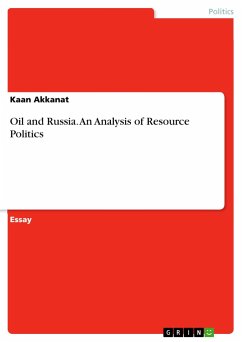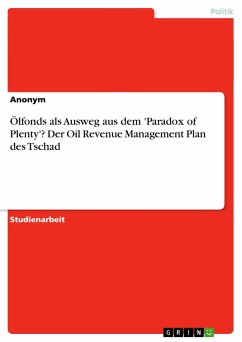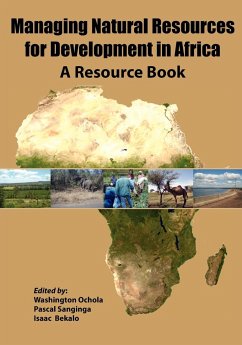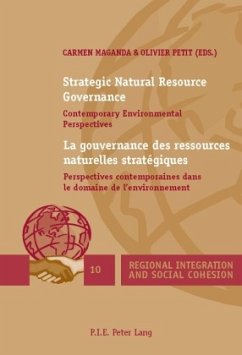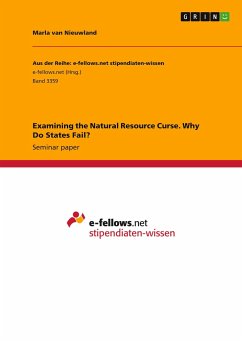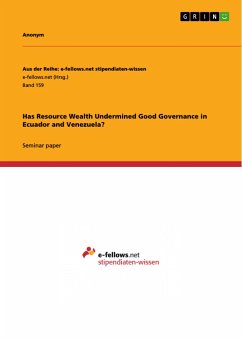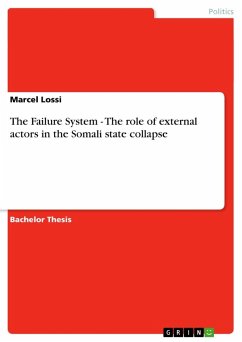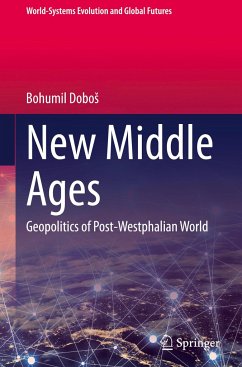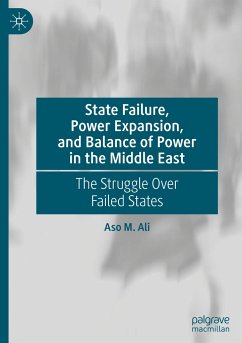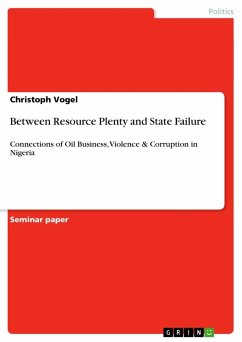
Between Resource Plenty and State Failure
Connections of Oil Business, Violence & Corruption in Nigeria

PAYBACK Punkte
0 °P sammeln!
Seminar paper from the year 2009 in the subject Politics - Region: Africa, grade: 2,0, University of Cologne (Institut für Afrikanistik), course: Konfliktherd Nigeria, language: English, abstract: Mineral wealth and concomitant phenomena of violence state weakness and corruptionhave been widely brought into contact by numerous scholars, as a considerable numberof empirical cases seem to give evidence to this. Particularly in Sub-Saharan Africa theexamples of Sierra Leone, Nigeria, Democratic Republic of Congo and Angola - just tomention some of the most striking ones - led to various hypothes...
Seminar paper from the year 2009 in the subject Politics - Region: Africa, grade: 2,0, University of Cologne (Institut für Afrikanistik), course: Konfliktherd Nigeria, language: English, abstract: Mineral wealth and concomitant phenomena of violence state weakness and corruptionhave been widely brought into contact by numerous scholars, as a considerable numberof empirical cases seem to give evidence to this. Particularly in Sub-Saharan Africa theexamples of Sierra Leone, Nigeria, Democratic Republic of Congo and Angola - just tomention some of the most striking ones - led to various hypotheses about the influence ofresource plenty on governance issues. Due to several specific characteristics, the case ofNigeria is different to many others. First of all, the Federal Republic of Nigeria turned outto be Africa's most populous state with about 140 million citizens. In addition the socialsituation is rather unique, as Nigeria consists of more than 250 ethnic groups. The morethan 500 spoken languages spoken in the country further illustrate the socio-culturaldiversity. Nevertheless the three major communities include more than two thirds of thecountry's total population.On the socio-economic dimension a key feature is the overwhelming importance ofoil as almost single export good and major contributor of the country's GDP. The strong dependence on oil has been challenging Nigeria's economyconsiderably and can be seen as a major reason for socio-economic disparities throughoutthe country, not to forget that it has been the origin for its '(political) Dutch disease'.Contrarily to other so-called 'crisis-states' the main issues threatening statehood andstability in Nigeria can be rather seen as domestic problems. Transnational issues like therelations with Cameroon do not have the same structuring quality as in other states.Although Nigeria improved in TI's CPI of 2008 the country still faces 'institutionalized' clientelism andrent-seeking at almost each political and social level as poor performance in 'group grievance', 'delegitimization of the state' or 'factionalized elites' may illustrate. Secondlymanifold forms of institutional and informal violence are destabilizing the socio-politicalarchitecture. Various attempts to counter those phenomena have been ineffective orimplemented insufficiently, sometimes not at all. The result is a current situation ofdisorder, human insecurity, economic inequality fed by a prosperous environment forindividual enrichment provided by a state which is rather effective in facilitating illicitpolitical and economic behaviours, be they plundering of public goods, drug or weapontrade or other.





